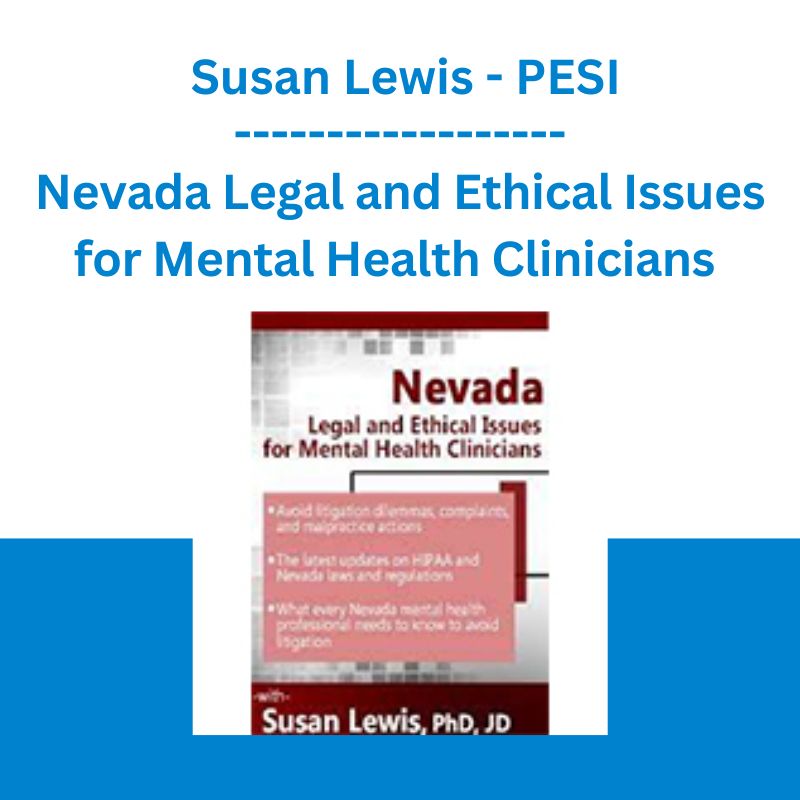*** Proof of Product ***
Exploring the Essential Features of “Nevada Legal and Ethical Issues for Mental Health Clinicians – Susan Lewis”
This program focuses on ethical, legal, statutory or regulatory policies, guidelines and standards that impact psychological practice and explores the manner by which clinical and ethical issues affect the everyday practice of the mental health professional in Nevada. This unique blend of clinical and ethical concerns allows for a more meaningful understanding and interpretation of the rules that govern mental health practice and allows the attendee to identify specific state laws that affect and govern their practice.
Through lecture, a review of references including the APA “Ethics Codes” and the seminar manual with state-specific policies and regulations; Dr. Lewis will prepare you for litigation issues which can put your client, your license and your practice at risk. You will learn how to structure your practice to limit exposure of risk, as well as discover record-keeping practices that may help protect you in the event of a complaint. Susan will provide you with the following take-home tools to minimize risk:
- Risk management strategies
- How to minimize litigation dilemmas, complaints and malpractice actions
- Best practices in the professional relationship, informed consent and office policies
You will learn through problem-solving discussions that are representative of actual ethical decisions you encounter in your clinical practice. The blending of Susan’s experience as a lawyer, work within the court system and extensive clinical experience makes her a hands-on, knowledgeable instructor!
Speaker
Susan Lewis, Ph.D., J.D.
Susan J. Lewis, Ph.D., J.D., is a licensed clinical and forensic psychologist and lawyer. She has over 25 years of experience in clinical practice with unique populations that have included female sexual offenders incarcerated at a woman’s prison, self-injurious individuals, forensic patients and individuals who suffer from severe and persistent mental illness. In addition to clinical practice, Dr. Lewis has served in leadership roles as clinical director, program manager, and supervisor for psychiatry residents and post-doctoral psychologists.
Currently, Dr. Lewis teaches courses on Law and Ethics in Mental Health that are state specific to the laws of each state. She has also lectured nationwide on the DSM-5® and differential diagnosis. She taught courses at Harvard’s Extension School and Northeastern University on The Psychology of Criminal Behavior. She is the author of Legal and Ethical Issues for Mental Health Clinicians: Best Practices for Avoiding Litigation, Complaints and Malpractice (PPM, 2016) and her latest book From Deep Within: A Forensic and Clinical Psychologist’s Journey (2018).
A sought-after consultant, Dr. Lewis works with attorneys on controversial issues such as dangerousness, competence to stand trial, criminal responsibility evaluations, and civil and criminal commitment. She works with attorneys on strategies of how mental illness might impinge on legal decision-making. Dr. Lewis has been adjudicated an expert in almost all of the district and superior courts in Massachusetts.
Her extensive clinical experience makes her a hands-on, knowledgeable instructor. She is engaging and has a wonderful sense of humor, which she brings to her seminars.
Speaker Disclosures:
Financial: Susan Lewis is in private practice. She receives a speaking honorarium from PESI, Inc. She has no relevant financial relationships with ineligible organizations.
Non-financial: Susan Lewis is a member of the American Psychological Association.
Objectives
- Describe how to avoid litigation dilemmas, licensing complaints and malpractice actions.
- Analyze the legal and ethical considerations for the treatment of minor populations in Nevada with regard to age of consent, confidentiality and custody concerns.
- Explain how an understanding of common boundary and dual relationship issues/dilemmas can help you maintain appropriate relationships with your clients.
- Identify the ethical challenges you should consider when responding to subpoenas that request disclosure of client records.
- Discuss the limits of confidentiality as it relates to duty to warn law in Nevada.
- Demonstrate how risk management strategies regarding technology can keep client information secure and avoid violating HIPAA.
Outline
Clinician-Client Relationship
- Law vs. ethics
- Elements of legal informed consent
- Nuts and bolts of office policies
- Records vs. psychotherapy notes
- What to put in a record
- Limitations on confidentiality
- Nevada case laws & danger to others
- Nevada duty to warn potential victims
- HIPAA
Practical Approach to Risk Management
- Elements of consent
- Competence & scope of practice
- Boundary violations/crossings
- Issues with modern technology
- Texting, cell phones, e-mail, video psychotherapy
- Perils of supervision
Litigation
- Licensing complaints & malpractice lawsuits
- Nevada specific statutes
- Nevada rules and regulations
- Case law and how to find it
Navigate the Legal System
- Roles of attorneys
- Confidentiality/privilege
- Subpoena & disclosure of confidential information
- Depositions, interrogatories, expert testimony
Treatment of Minors
- Nevada age of majority
- Consent to treatment
- Privilege/confidentiality
- Separation & divorce
Case Studies
Target Audience
- Counselors
- Social Workers
- Psychologists
- Case Managers
- Addiction Counselors
- Therapists
- Nurses
- Marriage & Family Therapists
- Other Mental Health Professionals
Reviews
Roberto S
“It was a magnificent explanation about law and HIPPA. “
Roberto S
“Wonderful topic. And excellent information about the law and HIPPA”
Martha R
“Great presentation. Learned a lot.”
Please see the full list of alternative group-buy courses available here: https://lunacourse.com/shop/









